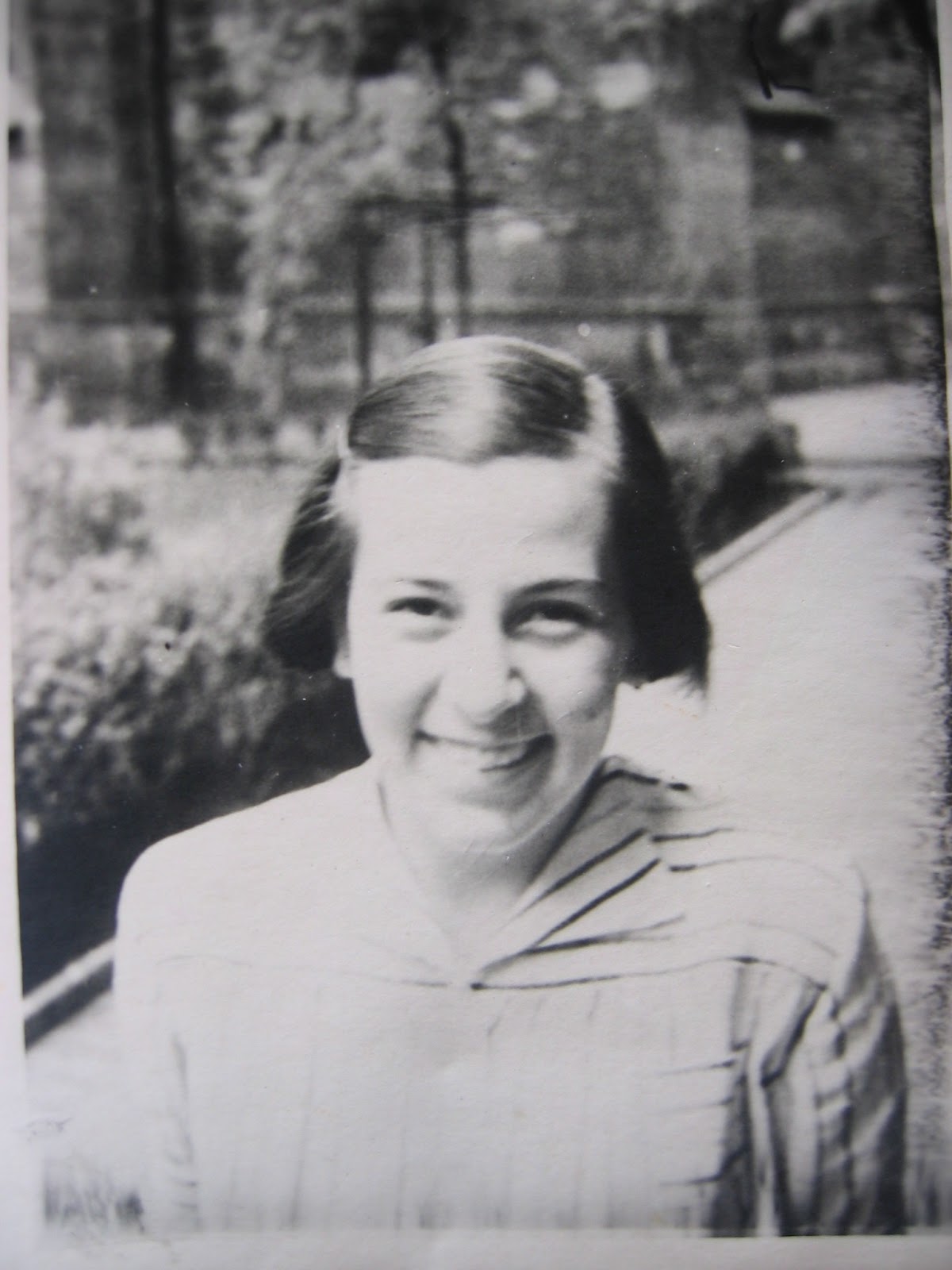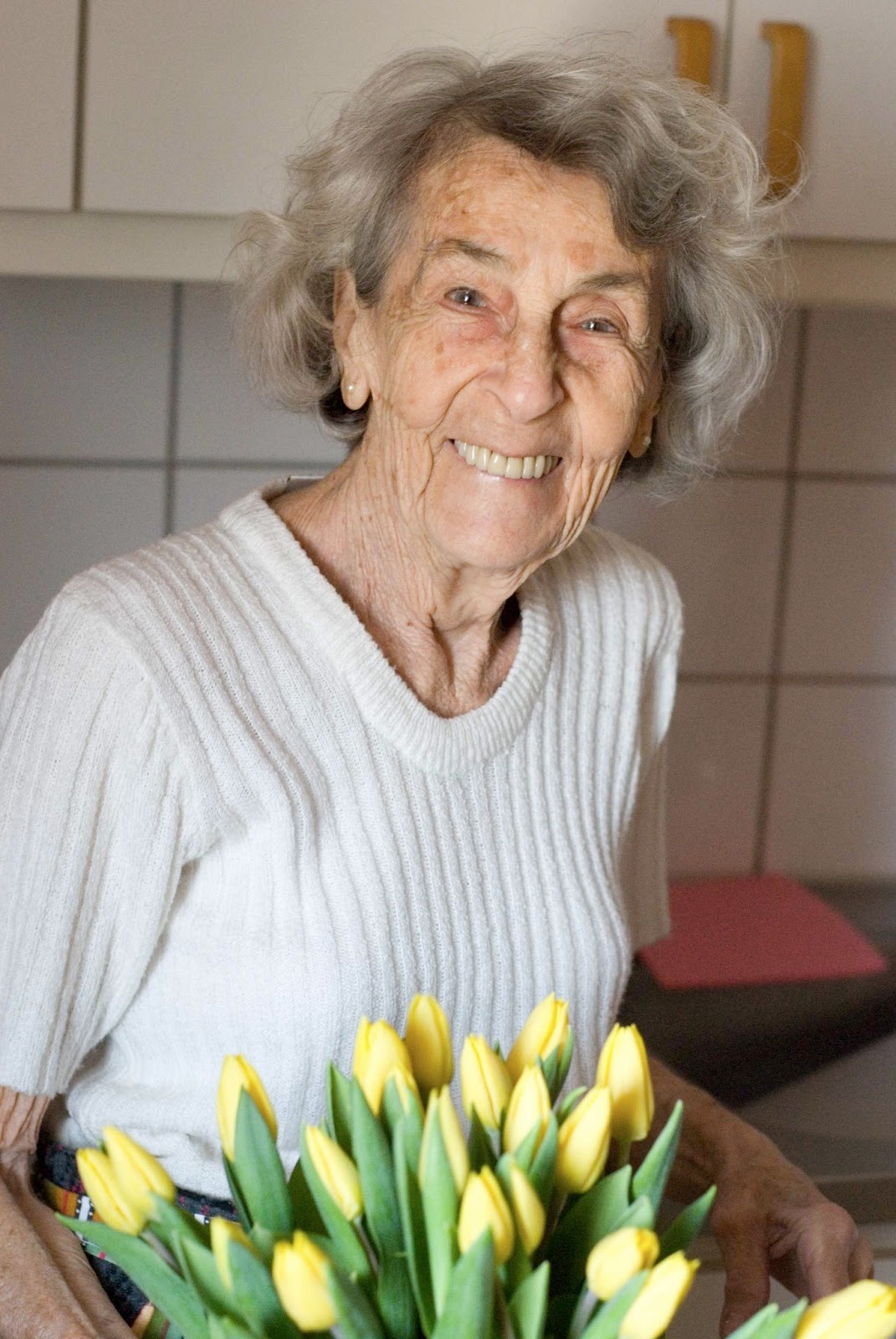written by Judita Matyasova
excerpt from new book, which will be released in Czech version in autumn 2013
Dita grew up in Prague, not
far from the Old Town Square. She lived in a house called Great Operetta. On
the walls downstairs were posters advertising the evening shows and during the
day one could hear singers rehearsing for their performances. The house was one
big maze; in the morning Dita would leave through one passage to go to school,
in the afternoon she would return through another one, to see Daddy in his tailor’s
shop; in her free time, she would attend gymnastics classes. “I always loved
sports and still do. I used to attend Makkabi Hacair, (Zionist youth classes – editor’s note). There were many friends of
mine, my cousins Slávka and Valda Jeiteles and also Hanka Dubová. We learned
that Palestine was our land where we could go to work in a kibbutz. That was
our dream which might come true one day. But things changed when Germans came
here. Suddenly, a journey to Palestine turned out to be one of the ways of escaping.
Fleeing far away from the Nazis. I wanted to enroll in the alíjá school (preparatory
classes for emigrating to Palestine – editor’s note) but my parents were
not as excited by such an idea. For me it was a chance to be with my peers and to
experience something new. Moreover, I believed that my parents would soon join
me abroad. In the end I persuaded them and in May 1939 began to go to alíjá school in Prague.
 |
| Dita in 1939, nearby alíyah school in Prague |
The summer passed quickly and
then things went fast. Our teachers told us that considering the political
situation in Czechoslovakia we could not continue our classes there. They found
foster families for us in Denmark. We were supposed to spend a short time there
and then go on to Palestine. Germans issued passports for us, as if they wanted
to expedite our departure. But those passports were of somewhat one-way sort.
We had to hand in all our money and valuables. I only travelled with a small
suitcase with the essential things. My parents then packed comforters, clothes
and shoes into a large wooden trunk which they sent to Denmark. Mommy lined it
with waxed paper and folded everything very neatly. She had several summer
dresses made for me because she thought that Denmark would only be a transit
station for me. Who could guess that we would stay there for four years and
never reach Palestine…”
On the sea for the first time
Midnight, 24th
October 1939. The last hours before departure. Children are gathering on a
platform at Masaryk Train Station in Prague. They are excited about travelling
together with their pals. Parents are standing aside, watching them. These
children act so grown-up, ready to face life. It feels like letting a young
bird leave the nest for the first time; it can hardly fly but wants to try so
badly. The train begins to move. Children are waving and the parents on the
platform are trying hard to smile. They believe they have done the best for their children. They are sending
them to safety and have to believe that this is only temporary. This parting is
final, though.
The journey through chilly
night goes fast. Dita and her friends are chatting, singing and nodding off
every now and then. Before they know it, they are in Berlin. Dita grabs her
suitcase and gets off with others. They take the underground to get to another
station. The next train takes them all the way to a small harbor town called
Warnemünde. For the first time they are for the first time on the sea, the ferry
taking them to their destination – Denmark. After two more hours on the train
they arrive in Copenhagen, to spend one night before moving on. In this foreign
country, everything is suddenly unfamiliar, even the beds. Everything is now unfamiliar,
except for their pals.
“Each of you will go to another
family, to another place,” Anne-Marie Nielsen explains. (Nielsen represented the Peace and Freedom League which secured foster
families for the children in Denmark – editor’s note). A wave of
disappointment, of anger perhaps. How could this happen? We wanted to be
together! But that is not possible due to safety reasons. Too many Jewish
children in one place might provoke suspicion.
Dita and her friends got each a
piece of paper with the name of their village on it. They are going by train,
watching the landscape outside. It is so different from Czech countryside. This
one is so incredibly mellow. No hills, no mountains, no forests. Just green and
grey plains, with a farmhouse every here and there. “My piece of paper said
Rislev. Mrs Nielsen told me to say goodbye to my friends. I got off at a
station with just a tin shelter, looking out for my foster parents. There was
no-one. Just me and the fields stretching far, not a single house to be seen. I
didn’t know what to do. Where to go? That was a terrible moment, being alone,
so far from home. After about an hour, another train came and three girls got
off. I tried to speak German to them and one of them responded: ‘You must be
the one that’s supposed to come to our place today.’ Things became clear then:
their parents were waiting for me in another village. This girl took me to
their farm called Nielsminde, walking her bike along,” Dita, who is now
eighty-eight, remembers.
No time to write
A large farmhouse. A room with
one bed, one shelf and a window looking out on a dusty road. This is now Dita’s world. She has to get used to a strict order observed by the Danish
household. She did all the jobs that were needed. “Sitting in school in Prague
was such a drag, while working in the fields was quite a different thing. I
enjoyed it so much. Feeding the chickens, cooking lunch, taking care of
children, cleaning up the kitchen. And in the evening I hit the sack. There was
no time for sorrows. Only at the beginning I felt homesick when I read letters
from home. My parents would go on why I wrote to them so little. How could I? I
was run off my feet all day. Only many years later I would realize what my
letters had meant to them. It was only through the letters that they knew I was
safe and sound,” Dita says.
 |
| Dita with her foster family in Rislev |
Messages from home arrive
several times a week. The postman stops by the farm and Dita opens another
letter. Mommy keeps worrying about the freezing cold in Denmark. Yes, it is
freezing, it is the hardest winter in the last forty years but Dita does not
mention this in her letters. She much rather describes how she goes to the
fields at five in the morning, harvesting beets. “I didn’t even have proper
trousers, just thin tights. We didn’t have much stuff, let alone money, but I
was not bothered by that. I was having a good time in Denmark, except of the
food. Their eating is somewhat upside down; for instance, we have potatoes,
sauce and meat, while they have it the other way round. They have a piece of
bread and then cold fish. I had to get used to it but that was no problem. When
you come from elsewhere, you have to adjust. We didn’t dwell on these things.
We hoped we would soon leave and that kept us going, it was a consolation for
me and my peers.”
Another escape
Time in Denmark would pass
quickly, to the rhythm of everyday chores, until October 1943 when the Nazis
decided to get hold of all Jews residing in Denmark. “Someone from the village
warned me, told me I had to leave at once. I grabbed a few things and was gone.
I kept pedaling, on and on, all the way to the coast. I ran into a few friends
on my way. When we reached one fishing village, we saw lots of people there.
They all wanted to flee. We had to pay and only then the fishermen would take
us onboard. We survived the twelve-hour journey, squished underdeck (usually, the journey from Denmark to Sweden
takes an hour; it took so long because of Nazi patrols on the sea back then –
editor’s note).
I found a job in Hedemora,
working on a farm again, just like my friends who rented a former rural
schoolhouse where they stayed together. I felt, however, that I would prefer
another kind of job. I had always been involved with children. So I found
myself a job as a children’s nurse in Helsingborg hospital. In summer 1945 I
went to Ramlösa, a spa where concentration camp survivors were recovering. They
needed someone who could translate from Polish. I couldn’t speak Polish but
that was no problem, Czech and Polish are similar. After two months I found a
job in a kindergarten in Helsingborg and then things went fast. I met my future
husband, Ragnar. He is Catholic and he had little idea about Judaism. And
Bohemia? None at all! But that didn’t matter. We got married in 1951, then
children came and all the things which kept us busy.
 |
| Dita and Ragnar |
I only found out after the war
what had happened with my folks. I could not believe that they had all died,
even my younger brother. The only ones that survived were my aunt and cousin. I
could not return to Czechoslovakia for years because of the Communists. It was only
in the late 1950s that I could visit. We could feel the lack of freedom in
Czechoslovakia; Communists were checking every single foreigner. In 1989 the
Communist regime fell and this was all over. That was beautiful,” Dita smiles
and plays a song on the piano, a tune she remembers from home, from the Great
Operetta.
 |
| Dita with small bell. A symbol of her connection with other friends from wartime |
Here are few photos of Dita with our film crew, filming in Rislev nearby Naestved. Photos by Rachael Cerrotti








Žádné komentáře:
Okomentovat